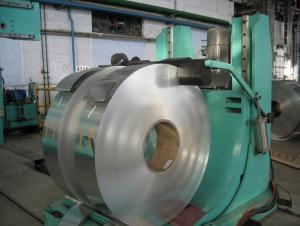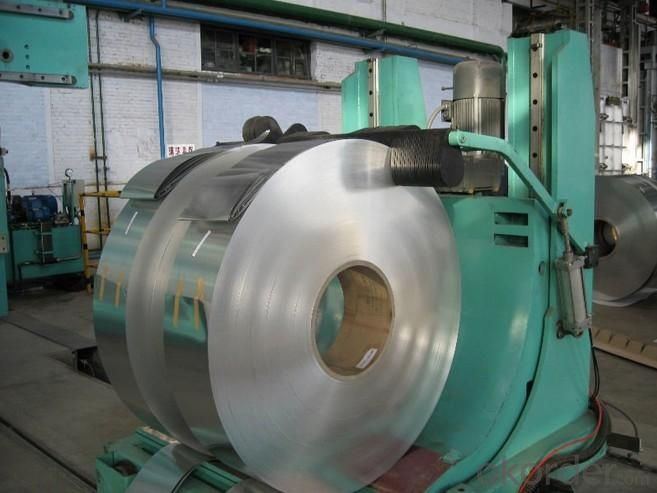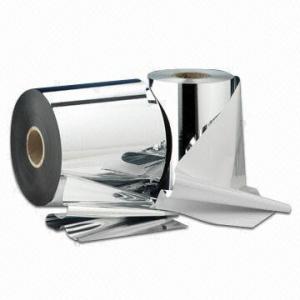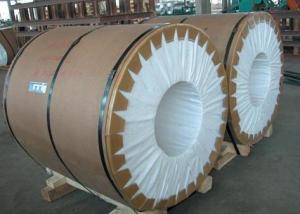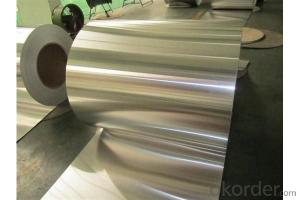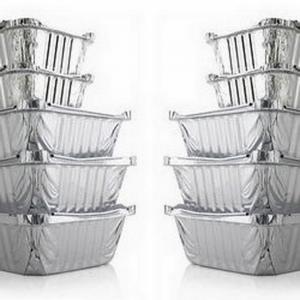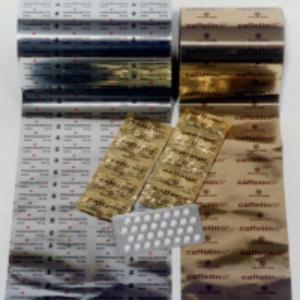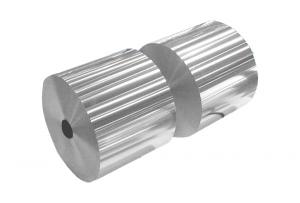Aluminum Industrial Foil Stock
- Loading Port:
- China Main Port
- Payment Terms:
- TT or LC
- Min Order Qty:
- 0 m.t.
- Supply Capability:
- 1000 MT / Month m.t./month
OKorder Service Pledge
OKorder Financial Service
You Might Also Like
Quick Details of Aluminium Foilstock for Industrial
Alloy: 3003/8011
Temper: H14/H16/H24/H26
Specifications of Aluminium Foilstock for Industrial
Thickness & Tolerance: 0.28 mm - 0.3 mm (+/-6%)
Width & Tolerance: 1000 - 2020 mm (+/-1 mm)
Core ID: 405/505/508 mm
Surface Quality: Good appearance with no-crack and well-distribute grain
Build Up: Tight slit edges free from crack, layer to layer shift not more than 2 mm
Fleatness: Mill flatness coil having slight edge waviness rather than center buckles shall be acceptable
Rolling Performance: Re-rollable to the final desired gauges
Standard: GB/T3198 / ASTM-B209
Usage/Application of Aluminium Foilstock for Industrial
The aluminium foil stock for final rolling gauges down to min 6 micron
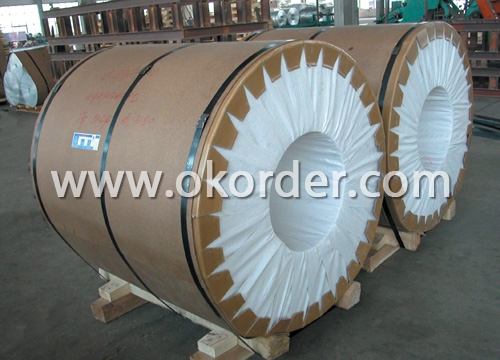
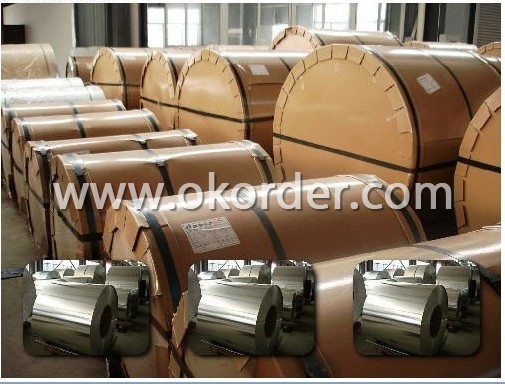
- Q: Is the accumulation of aluminum in the body harmful to health?
- <p>Aluminum buildup in the body has been a subject of concern, particularly in relation to Alzheimer's disease. While aluminum is naturally present in the environment and is used in various products, including food packaging and cookware, there is no strong scientific evidence to support the claim that aluminum exposure or accumulation causes health problems in humans. The World Health Organization and other health authorities have stated that aluminum intake from food and drinking water is not a significant health risk for the general population. However, it is always recommended to follow good hygiene practices and use cookware that is known to be safe for food preparation to minimize any potential risks.</p>
- Q: This question asks for an enumeration of different types of aluminum alloys.
- <p>Aluminum alloys are categorized based on their primary alloying elements and their applications. Some common types include: 1) 1000 series (99% pure aluminum), 2) 2000 series (alloyed with copper), 3) 3000 series (alloyed with manganese), 4) 4000 series (alloyed with silicon), 5) 5000 series (alloyed with magnesium), 6) 6000 series (alloyed with magnesium and silicon), and 7) 7000 series (alloyed with zinc). These alloys have various properties, making them suitable for different industries such as aerospace, automotive, and construction.</p>
- Q: Explain the environmental impact of using aluminum in construction materials.
- <p>Aluminum used in building materials has both positive and negative environmental impacts. On the positive side, aluminum is lightweight, durable, and highly recyclable, which reduces waste and conserves resources. It also has good thermal conductivity, which can improve energy efficiency in buildings. However, the production of aluminum is energy-intensive and generates greenhouse gases, contributing to climate change. Additionally, the mining and processing of bauxite, the primary source of aluminum, can lead to habitat destruction and water pollution. Despite these issues, the recyclability of aluminum means that its environmental footprint can be significantly reduced through proper recycling practices.</p>
- Q: Is it possible to utilize aluminum in the construction of automobiles?
- <p>Yes, aluminum is widely used in automobiles due to its lightweight, high strength, and excellent corrosion resistance. It is commonly found in engine components, body panels, and wheels. The use of aluminum can lead to reduced vehicle weight, which improves fuel efficiency and reduces emissions. Additionally, aluminum's recyclability makes it an environmentally friendly choice for automotive manufacturing.</p>
- Q: This question asks for common applications of aluminum in everyday life.
- <p>Aluminum is widely used in daily life due to its lightweight, durability, and resistance to corrosion. It is commonly found in beverage cans, food packaging, and cookware. Aluminum is also used in construction for window frames, doors, and roofing. It is a key material in the manufacturing of vehicles, including cars, airplanes, and bicycles, due to its strength-to-weight ratio. In electronics, aluminum is used in heat sinks and wiring. Additionally, it is used in everyday items like foil, furniture, and sports equipment. Its versatility makes aluminum an essential material in many aspects of modern life.</p>
- Q: How can we decrease our reliance on aluminum in everyday life?
- <p>Yes, there are several ways to reduce the use of aluminum in daily life. Opt for glass, ceramic, or stainless steel containers instead of aluminum ones. Choose wooden or bamboo utensils over aluminum ones. When possible, select products with minimal aluminum packaging. Avoid non-stick cookware, as it often contains aluminum. Use a cast iron or glass baking sheet instead of aluminum foil in the oven. Educate yourself on the presence of aluminum in everyday products and make conscious choices to reduce exposure.</p>
- Q: Describe the process of electrolysis used in aluminum production.
- <p>The process of electrolysis for aluminum production involves the Hall-H茅roult process, which is the primary method for extracting aluminum from its ore, bauxite. First, bauxite is refined to produce aluminum oxide (alumina). This alumina is then dissolved in a molten cryolite bath, which lowers the melting point and increases the electrical conductivity. Large amounts of electricity are passed through the bath, causing the alumina to decompose into aluminum metal and oxygen gas. The aluminum collects at the bottom of the cell and is periodically tapped off, while the oxygen is released into the atmosphere. This energy-intensive process is crucial for the aluminum industry, as it allows for the production of large quantities of aluminum, a key material in various industries.</p>
- Q: Is it possible to employ aluminum for the creation of innovative packaging materials?
- <p>Yes, aluminum is highly suitable for making new types of packaging materials due to its lightweight, malleability, and corrosion resistance. It is often used in food and beverage cans, pharmaceutical packaging, and even flexible packaging films. Aluminum's recyclability also makes it an environmentally friendly choice for sustainable packaging solutions. Innovations in aluminum packaging continue to emerge, focusing on improved barrier properties, lighter weight, and enhanced recycling capabilities.</p>
- Q: Is there a link between aluminum exposure and the development of dementia?
- <p>Aluminum has been a subject of concern regarding its potential link to dementia, particularly Alzheimer's disease. However, current scientific consensus indicates that there is no conclusive evidence to support the claim that aluminum causes dementia. Extensive research has been conducted, and the majority of studies have not found a direct causal relationship between aluminum exposure and the development of Alzheimer's or other forms of dementia. While aluminum is naturally present in the environment and can be found in some foods, water, and medications, the body typically does not absorb significant amounts, and any absorbed aluminum is usually efficiently excreted. It is important to continue monitoring scientific research for any new findings, but as of now, aluminum is not considered a proven cause of dementia.</p>
- Q: This question is asking for methods to effectively and safely clean aluminum surfaces without causing damage.
- <p>To clean aluminum surfaces effectively and safely, use a mild soap or detergent mixed with warm water. Avoid abrasive cleaners or tools that can scratch the surface. Gently scrub the surface with a soft cloth or sponge, and rinse thoroughly with clean water. For stubborn stains, consider using a specialized aluminum cleaner or vinegar solution. Always dry the surface immediately after cleaning to prevent water spots. Regular cleaning and maintenance will help prevent the build-up of dirt and grime, keeping your aluminum surfaces looking their best.</p>
Send your message to us
Aluminum Industrial Foil Stock
- Loading Port:
- China Main Port
- Payment Terms:
- TT or LC
- Min Order Qty:
- 0 m.t.
- Supply Capability:
- 1000 MT / Month m.t./month
OKorder Service Pledge
OKorder Financial Service
Similar products
Hot products
Hot Searches
Related keywords
